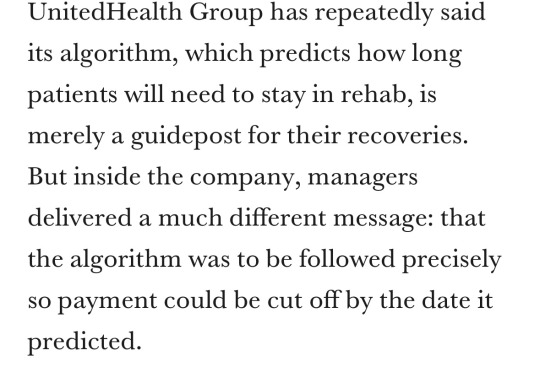#private health
Text
#politics#tory#conservative party#uk#private health#ukpol#neoliberalism#privatisation#corruption#lobbying
138 notes
·
View notes
Text
Private Sector Good, Public Sector Bad? (3)
This is the third part of a look at former public services and utilities in Britain that have been privatised or part-privatised in the name of neoliberal economics and the mistaken belief that private enterprise is ALWAYS more efficient than publicly run bodies.
The National Health Service
The Tory Party and successive Tory governments, including the Sunak administration, vehemently deny they are slowly privatising the NHS.
“Sunak pledges to cut waits with greater healthcare choice but denies NHS privatisation plan." (Health and Protection: 04/01/23)
Such denials are deliberately misleading. According to the World Health Organisation:
“Privatisation is where non-government bodies become increasingly involved in the financing or provision of health care services”.
The Tory Health Care Act of 2012 removed the "duty of government” to provide NHS services directly, opening up NHS care provision to the private sector. This trend has been further accelerated by the 2022 Heath and Care Act. The Guardian had this to say about the change in the law:
“The new bill will continue the dismantling of the NHS, this time by adopting more features from the US health system. For anyone who cares about the NHS, this should set off alarm bells.” (Guardian: 07/12/21)
What we need to remember when reviewing the provision of public services by private companies is that the first duty of a private company is to make profits for it’s shareholders. The profit driven motive of private enterprise may lead to more cost savings but often at the expense of quality of service
“There is only a small number of studies addressing the effect of privatisation on the quality of care offered by health-care providers, and yet within this small group of longitudinal studies, we find a fairly consistent picture. At the very least, health-care privatisation has almost never had a positive effect on the quality of care." (Lancet: "The effect of health-care privatisation on the quality of care”, March 2024
In 2019, (November 29th) the Guardian reported that private firms had received £15bn over a five-year period for NHS provision. By 2019/20 Health Care Commissioners were spending £10bn a year on services delivered by the private sector. (The Kings Fund: Is the NHS being privatised, 01/03/21)
Despite this massive increase in NHS private provision, we all know the health service is on its knees. Before 2010 multi-year funding of the largely publicly run NHS saw the NHS improve its service provision. 14 years of Tory government, two health care acts later, and we see a total reversal in those trends. By 2014 signs of stress were becoming apparent. David Cameron and George Osborne deliberately starved the NHS of money, NHS budgets rising on average only 1.4% between 2009-19 compared to the 3.7% yearly rises since the NHS was first established.
The NHS is slowly bleeding to death: emergency departments are overcrowded, extended waiting times in A&E are leading to over 200 unnecessary deaths per week, there are not enough hospital beds, staff are demoralised, and doctors strikes continue because the government refuses to pay public sector workers a fair wage. Waiting lists continue to grow, it is impossible to find a NHS dentist and sick people have to wait weeks for a simple GP appointment.
This systematic rundown of the NHS by successive Tory governments is not all bad news as privatisation has benefited the lucky few.
Staff agencies are doing very nicely thank you, the BBC reporting that:
“Companies providing freelance staff to the NHS to cover for big shortages of doctors and nurses have seen their income rise by tens of millions of pounds since 2019.” (24/03/23)
Total spending on agency staff in England was £3bn in 2021, one hospital reportedly paying £5200 to a free-lance doctor for a single shift. It would be nice to say that doctors are not complicit in the gradual privatisation of the NHS but that would be untrue.
“Hundred’s of England's NHS consultants have shares in private clinics.” (Guardian: 21/01/22)
Over a billion pounds has been generated by these set ups since 2015
But it is not only doctors who profit personally from privatisation. During the pandemic, top Tories were very quick to pass on lucrative contracts to their friends in business. These largely unscrutinised public contracts have drawn accusations of “cronyism” and "chumocracy". Others have been more blunt, the Financial Times (06/08/21) asking the question: “When does cronyism become corruption?"
The shortage of PPE during the pandemic led to contracts being awarded to companies without competition. Literally billions of pounds were given to private companies to supply gowns, gloves, and face masks.
“But the way these deals have been given to firms has led to concerns over a lack of detail about why particular suppliers were chosen. The government has also been accused of favouring firms with political connections to the Conservative Party with a "high-priority lane". (BBC News: 20/04/21)
This accusation turned out to be true.
"UK government’s ‘VIP lane' for PPE suppliers was unlawful. High Court rules.” (Financial Times 12/01/22)
Although Michael Gove claimed that “every single procurement decision" went through an eight-stage-process” the courts found that nearly fifty PPE deals were fast tracked by Conservative ministers, who awarded contracts worth £5bn to companies with political or Whitehall connections. Four Tory MP’s and three Tory peers were named as “referrers” Michael Gove, Penny Mordant and Esther McVey are said to have personally recommended firms.
Some MP’s have done a lot more than fast-tracking private health care provision. Many of them have actually invested in private health care companies while others are happy to accept financial donations from them.
Wes Streeting, Shadow Health Secretary and the poster boy for Keir Starmer’s Labour Party, is said to have accepted “£22,5000 in private donations from private health firms last year.” (VOX Political: 30/04/23) Other Labour notaries are also said to have financial connections to private health care companies. Keir Starmer has received £157,500, Yvette Cooper has received £295,205, and Dan Jarvis has received £137,500. (Labour Heartlands: Selling Out the NHS: The Shocking Links Between Labour MP’s and Private Healthcare Donations: 17/06/23)
On the Conservative side, The Mirror (21/01/23) reports that Penny Mordant accepted £10,000 from care home firm Renaissance Care, while ex-health minister Steve Brine made £200 an hour giving “strategic advice” to drug firm Signa, before resigning in 2021. Publicly available information tells that that at least 28 Tory MP’s and Peers have had ties to private health and medical groups. Even the former Health Secretary Sajid Javid had share options in a Californian tech company dealing in health sector software.
So, while the NHS slowly disintegrates for want of proper investment and strategic planning, individual MP's and private health care providers reap the rewards of privatisation. Should this in any way be doubt then listen to what former Conservative Prime Minister John Major had to say as long ago as June 2016:
“The NHS is about as safe from them (Tory Brexiteers) as a pet hamster would be with a hungry python.”
Unfortunately, and to its eternal shame, the same can now be said of Keir Starmer’s Labour Party.
#uk politics#MHS#privatisation#private health#keir starmer#wea streeting#penny mordant#Michael gove#unlawful#donations#cronyism#corruption#morality. deaths#sickmess. underprovision
6 notes
·
View notes
Text
Labour accepts that private medicine is needed to save the NHS | Conservative Home
In 1948 the NHS was created, but within it there has always been an element of private health, if that element is used to maintain the NHS well that is good, but if used to destroy the NHS it is not.
Resources are resources whether they are in the NHS or private so it does make sense to use all resources effectively. But in doing so the resources of the NHS have to be increased as in the…
View On WordPress
0 notes
Text
Mark Friday, May 26 and Saturday, May 27 on your calendars. Then, circle these dates, highlight them and put a star next to them. May 26 and 27, Ontario Health Coalition (OHC) will be holding a citizens’ referendum with more than a thousand voting stations across Ontario. Online voting with be available starting May 2 – and I encourage everyone reading this to vote online as soon as the site is activated.
The referendum is in response to the Ford government’s announcement that it’s moving ahead with Bill 60, Your Health Care Act, which is expected to pass this week.
The legislation significantly expands privatization of surgeries and diagnostics as well as private for-profit hospitals and clinics – something the Ford government said they would never do during the lead-up to the election.
Once this legislation is passed the government will move with lightening speed to dismantle universal health care.
Full article
Tagging: @politicsofcanada
#cdnpoli#canadian politics#canadian news#canada#canadian#ontario#bill 60#doug ford#conservatives#healthcare#healthcare privatization#private healthcare#your health care act
3K notes
·
View notes
Text

1K notes
·
View notes
Text
When private equity destroys your hospital

I'm on tour with my new novel The Bezzle! Catch me TOMORROW in PHOENIX (Changing Hands, Feb 29) then Tucson (Mar 9-10), San Francisco (Mar 13), and more!

As someone who writes a lot of fiction about corporate crime, I naturally end up spending a lot of time being angry about corporate crime. It's pretty goddamned enraging. But the fiction writer in me is especially upset at how cartoonishly evil the perps are – routinely doing things that I couldn't ever get away with putting in a novel.
Beyond a doubt, the most cartoonishly evil characters are the private equity looters. And the most cartoonishly evil private equity looters are the ones who get involved in health care.
(Buckle up.)
Writing for The American Prospect, Maureen Tcacik details a national scandal: the collapse of PE-backed hospital chain Steward Health, a company that bought and looted hospitals up and down the country, starving them of everything from heart valves to prescription paper, ripping off suppliers, doctors and nurses, and callously exposing patients to deadly risk:
https://prospect.org/health/2024-02-27-scenes-from-bat-cave-steward-health-florida/
Steward occupies a very special place in the private equity looting cycle. Private equity companies arrange themselves on a continuum of indiscriminate depravity. At the start of the continuum are PE funds that buy productive and useful firms (everything from hospitals to car-washes) using "leveraged buyouts." That means that they borrow money to buy the company and use the company itself as collateral: it's like you getting a bank-loan to buy your neighbor's mortgage out from under them, and using your neighbor's house as collateral for that loan.
Once the buyout is done, the PE fund pays itself a "special dividend" (stealing money the business needs to survive) and then starts charging the business a "management fee" for the PE fund's expertise. To pay for all this, the PE bosses start to hack away at the company. Quality declines. So do wages. Prices go up. The company changes suppliers, opting for cheaper alternatives, often stiffing the old company. There are mass layoffs. The remaining employees end up doing three peoples' jobs, for lower wages, with fewer materials of lower quality.
Eventually, that top-feeding PE company finds a more desperate, more ham-fisted PE company to unload the business onto. That middle-feeding company also does a leveraged buyout, pays itself another special dividend, cuts wages, staffing and quality even further. They switch to even worse suppliers and stiff the last batch. Prices go up even higher.
Then – you guessed it – the middle-feeding PE company finds an even more awful PE bottom-feeder to unload the company onto. That bottom feeder does it all again, without even pretending to leave the business in condition to do its job. The company is a shambling zombie at this point, often producing literal garbage in place of the products that made its reputation. Employees' paychecks bounce, or don't show up at all. The company stops bothering to pay the lawyers that have been fending off its creditors. Those lawyers sue the company, too.
That's the kind of PE company Steward Health was, and, as the name suggests, Steward Health is in the business of stripping away the very last residue of value from community hospitals. As you might imagine, this gets pretty fucking ugly.
Steward owns 32 hospitals up and down the country, though its holdings are dwindling as the company walks away from its debt-burdened holdings, after years of neglect that have rendered them unfit for use as health facilities – or for any other purpose. Tcacik's piece offers a snapshot of one such hospital: Florida's Rockledge Regional Medical Center, just eight miles from Cape Canaveral.
Rockledge is a disaster. The fifth floor was, at one point, home to 5,000 bats.
Five.
Thousand.
Bats.
(Rockledge stiffed the exterminators.)
The bats were just the beginning. One of the internal sewage pipes ruptured. Whole sections of the hospital were literally full of shit, oozing out of the walls and ceiling, slopping over medical equipment.
That's an urgent situation for any hospital, but for Rockledge, it's catastrophic, because Rockledge is a hospital without any hospital supplies. Steward has stiffed the companies that supply "heart valves, urology lasers, Impella catheters, cardiac catheterization balloons, slings for lifting heavier patients, blood and urine test reagents, and most recently, prescription paper." Key medical equipment has been repossessed. So have the Pepsi machines. The hospital cafeteria had its supply of cold cuts repossessed:
https://www.reddit.com/r/massachusetts/comments/1agc1j4/comment/kolicqo/
It's not just Steward's nonpayments that reek of impending doom. Its payments also bear the hallmarks of a scam artist on the brink of blowing off the con. The company recently paid off a vendor with five separate checks for $1m, each drawn on "a random hospital in Utah" (Steward recently walked away from its Utah hospitals; its partners there are suing it for stealing $18m on their way out the door).
This company – which owns 32 hospitals! – has resorted to gambits like sending photos of fake checks to doctors it hasn't paid in months as "proof" that the money was coming (the checks arrived 22 days later).
Steward owes so much money to its employees – $1.66m to just one doctors' group. But the medical staff keep doing their jobs, and are reluctant to speak on the record, thanks to Steward's reputation for vicious retaliation. Those health workers keep showing up to take care of patients, even as the hospital crumbles around them. One clinician told Tcacik: "I watched a bed collapse underneath a [patient] who had just undergone hip surgery."
Rockledge has nine elevators, but only five of them work – the other four have been broken for a year. The hospital's fourth floor has been converted to "a graveyard of broken beds." The sinks are clogged, or filled with foul gunk. There's black mold. Nurses have noted on the maintenance tags that the repair service refuses to attend the hospital until their overdue bills are paid. The fifteen-person on-site maintenance team was cut to just two workers.
Steward is just the latest looting owner of Rockledge. After the Great Financial Crisis, private equity consultants helped sell it to Health Management Associates. The hospital's CEO took home a $10m bonus for that sale and exited; Health Management Associates then quickly became embroiled in a Medicare fraud and kickback scandal. Soon after, Rockledge was passed on to Community Health Systems, who then sold it on to Rockledge.
Steward, meanwhile, was at that time owned by an even bigger private equity giant, Cerberus, which then sold Steward off. That deal was performatively complex and hid all kinds of mischief. Prior to Cerberus's sell-off of Steward, they sold off Steward's real-estate. The buyer was Medical Properties Trust, who gave Cerberus $1.25b for the real-estate: three hospitals in Florida and three more in Ohio. Steward then contracted to operate these hospitals on MPT's behalf, and pay MPT rent for the real-estate.
This complex arrangement was key to siphoning value out of the hospital and to keeping angry creditors at bay – if you can't figure out who owes you money, it's a lot harder to collect on the debt. The scheme was masterminded by Steward founder/CEO Ralph de la Torre. De la Torre is notorious for taking a massive dividend out of the company while it owed $1.4b to its creditors. He bought a $40m yacht with the money.
De la Torre was once feted as a business genius who would "disrupt" healthcare. But as Steward's private jet hops around "Corfu, Santorini, St. Maarten and Antigua"
as its hospitals literally crumble, he's becoming less popular. In Massachusetts, politicians have railed against Steward and de la Torre (Governor Healey wants the company to leave the state "as soon as possible").
Florida, by contrast, is much more friendly to Steward. The state Health and Human Services Committee chair Randy Fine is an ardent admirer of hospital privatization and is currently campaigning to sell off the last community hospital in Brevard County. The state inspectors are likewise remarkably tolerant of Steward's little peccadillos. The quasi-governmental agency that inspects hospitals has awarded this shit-and-bat-filled, elevator-free, understaffed rotting hulk "A" grades for quality.
These inspectors jointly represent a mismatched assortment of private and public agencies, dominated by a nonprofit called Leapfrog, the brainchild of Harvard public-health prof Lucian Leape, who founded it in 2000. Leapfrog likes to tout its "transparent" assessment criteria, and Steward are experts at hitting those criteria, spending the exact minimum to tick every box that Leapfrog inspectors use as proxies for overall quality and safety.
This is a pretty great example of Goodhart's Law: "every measurement eventually becomes a target, whereupon it ceases to be a good measurement":
https://xkcd.com/2899/
But despite Steward's increasingly furious creditors and its decaying facilities, the company remains bullish on its ability to continue operations. Medical Properties Trust – the real estate investment trust that is nominally a separate company from Steward – recently hosted a conference call to reassure Wall Street investors that it would be a going concern. When a Bank of America analyst asked MPT's CFO how this could possibly be, given the facility's dire condition and Steward's degraded state, the CFO blithely assured him that the company would get bailouts: "We own hospitals no one wants to see closed."
That's the thing about PE and health-care. The looters who buy out every health-care facility in a region understand that this makes them too big to fail: no matter how dangerous the companies they drain become, local governments will continue to prop them up. Look at dialysis, a market that's been cornered by private equity rollups. Today, if you need this lifesaving therapy, there's a good chance that every accessible facility is owned by a private equity fund that has fired all its qualified staff and ceased sterilizing its needles. Otherwise healthy people who visit these clinics sometimes die due to operator error. But they chug along, because no dialysis clinics is worse that "dialysis clinics where unqualified sadists sometimes kill you with dirty needles":
https://www.thebignewsletter.com/p/the-dirty-business-of-clean-blood
The bad news is that private equity has thoroughly colonized the entire medical system. They took hospitals, fired the doctors, then took over the doctors' groups that provided outsource staff to the hospital:
https://pluralistic.net/2020/04/04/a-mind-forever-voyaging/#prop-bets
It's illegal for private equity companies to own doctors' practices (doctors have to own these), but they obfuscated the crime with a paper-thin pretext that they got away with despite its obvious bullshittery:
https://pluralistic.net/2020/05/21/profitable-butchers/#looted
The financier who decides whether you live or die depends on an algorithm that literally sets a tolerable level of preventable deaths for the patients trapped in the practice:
https://pluralistic.net/2023/08/05/any-metric-becomes-a-target/#hca
Private equity also took over emergency rooms and boobytrapped them with "surprise billing" – junk fees that ran to thousands of dollars that you had to pay even if the hospital was in network with your insurer. They made billions from this, and spent a many millions from that booty keeping the scam alive with scare ads:
https://pluralistic.net/2020/04/21/all-in-it-together/#doctor-patient-unity
The whole health stack is colonized by private equity-backed monopolies. Even your hospital bed!
https://pluralistic.net/2022/01/05/hillrom/#baxter-international
Then there's residential care. Private equity cornered many regional markets on nursing homes and turned them into slaughterhouses, places where you go to die, not live:
https://pluralistic.net/2021/02/23/acceptable-losses/#disposable-olds
The palliative care sector is also captured by private equity. PE bosses hire vast teams of fast-talking salespeople who con vulnerable older people into entering an end-of-life system before they are ready to die. Thanks to loose regulation, the nation is filled with fake hospices that can rake in millions from Medicare while denying all care to their patients (hospice patients don't get life-extending medication or procedures, by definition):
https://pluralistic.net/2023/04/26/death-panels/#what-the-heck-is-going-on-with-CMS
If you survive this long enough, Medicare eventually tells the hospice that you're clearly not dying and you get kicked off their rolls. Now you have to go through the lengthy bureaucratic nightmare of convincing the system – which was previously informed that you were at death's door – that you are actually viable and need to start getting care again (good luck with that).
If that kills you, guess what? Private equity has rolled up funeral homes up and down the country, and they will scam your survivors just as hard as the medical system that killed you did:
https://pluralistic.net/2022/09/09/high-cost-of-dying/#memento-mori
The PE sector spent more than a trillion dollars over the past decade buying up healthcare companies, and it has trillions more in "dry powder" allocated for further medical acquisitions. Why not? As the CFO of Medical Properties Trust told that Bank of America analyst last week, when you "own hospitals no one wants to see closed." you literally can't fail, no matter how many people you murder.
The PE sector is a reminder that the crimes people commit for money far outstrip the crimes they commit for ideology. Even the most ideological killers are horrified by the murders their profit-motivated colleagues commit.
Last year, Tkacic wrote about the history of IG Farben, the German company that built Monowitz, a private slave-labor camp up the road from Auschwitz to make the materiel it was gouging Hitler's Wehrmacht on:
https://pluralistic.net/2023/06/02/plunderers/#farben
Farben bought the cheapest possible slaves from Auschwitz, preferentially sourcing women and children. These slaves were worked to death at a rate that put Auschwitz's wholesale murder in the shade. Farben's slaves died an average of just three months after starting work at Monowitz. The situation was so abominable, so unconscionable, that the SS officers who provided outsource guard-labor to Monowitz actually wrote to Berlin to complain about the cruelty.
The Nuremberg trials are famous for the Nazi officers who insisted that they were "just following order" but were nonetheless executed for their crimes. 24 Farben executives were also tried at Nuremberg, where they offered a very different defense: "We had a fiduciary duty to our shareholders to maximize our profits." 19 of the 24 were acquitted on that basis.
PE is committed to an ideology that is far worse than any form of racial animus or other bias. As a sector, it is committed to profit above all other values. As a result, its brutality knows no bounds, no decency, no compassion. Even the worst crimes we commit for hate are nothing compared to the crimes we commit for greed.

If you'd like an essay-formatted version of this post to read or share, here's a link to it on pluralistic.net, my surveillance-free, ad-free, tracker-free blog:
https://pluralistic.net/2024/02/28/5000-bats/retaliation#charnel-house
#pluralistic#Rockledge Regional Medical Center#private equity#looting#Steward Health#ponzis#maureen tcacik#Medical Properties Trust#Ralph de la Torre#Massachusetts#florida#Cerberus#too big to fail#pe#guillotine watch
341 notes
·
View notes
Text


Source

Source
#health#health care#public health#capitalism#news#current events#private health care#Medicare for all#universal healthcare#the left#progressive#end capitalism
564 notes
·
View notes
Note
it occurred to me this morning that machete is a cardinal, so in some universe he could feasibly become pope. i can't imagine anyone more stressed out than Machete As Pope
.
#it'd be extremely unlikely but not impossible! as a cardinal he's definitely eligible#he's nowhere near popular prestigious connected and wealthy enough to compete against his more influential and power-hungry peers#I don't think he'd want that either#despite his high status he's a very private and reserved person and being a Pope is all about the pomp and circumstance#and I don't think he'd survive for long#he'd get some kind of disastrous mental breakdown or his health would completely give in under the stress and pressure#he's good at being a ruler's competent right hand man or second-in-command#but as a sole leader it's more likely he'd quickly lose his sense of direction and collapse like a house of cards#answered#doomcountry
195 notes
·
View notes
Text
one thing that kind of makes me sad seeing all of the (extremely deserved) love that hayden christensen is getting since the kenobi show press tour, and ahmed best getting that (wonderful, extremely deserved) jedi role in the mandalorian, is the conspicuous absence of jake lloyd, who has not returned to the public eye in a similar way. mr lloyd also did not deserve the harassment that he got back when the movie came out, he was a literal child who did an amazing job with his role. the bullying and negativity must have been so difficult for him to manage growing up. as a bipolar person myself, i have so much empathy for the difficulty in managing schizophrenia. i just hope that somehow, somewhere he knows that prequels fans have so much love for him and appreciation for his work too
#jake lloyd#anakin skywalker#totally respect him living a private life#im manifesting happiness for him#sw#cw mental health
401 notes
·
View notes
Text
People who are worried they aren't helping with climate change or any other big world problem bc they do something like make video games or art or are a cashier at a grocery store:
You are helping. You are making the art that helps me, an environmentalist actively working to restore biodiversity and ecosystems, get through each day. You are helping those of us on the front lines enjoy living or take a well-needed break. The person loading my groceries into my car is making it so I can eat that week and have enough energy to do my work. If you want to do more, you can volunteer, donate, and boost the voices of local community leaders working to protect and restore the local ecosystems, but don't feel bad if you can't. We are all in this together.
#the only people who should feel bad are the ones actively contributing to the problem more than anyone else is#i mean rich people who take private jets not you who threw away a plastic bottle instead of recycling it#and fill up their giant swimming pools during droughts (and dont even swim in them!!!)#i personally chose my field bc i didnt want to stand by as all this bad crap happened#and because i love being outdoors and i love critters#but everyone elses jobs are important too#even people who cant work are valuable bc you give us a reason to fight for a better world for you#eventually i may have to stop working if my health gets worse but that doesnt mean i wont be valuable#i hope this makes sense#ramble#conservation#environmentalism#save the earth
292 notes
·
View notes
Text






“Be the kind of woman that makes other women want to be you.”
#beauty#luxury#rich#hypergamy#fashion#glamour#black woman luxury#travel#health#home & lifestyle#my post#dating#spoiled#wealth#classy#elegance#private jet#luxury cars#flowers#louis vuitton
627 notes
·
View notes
Text
too many people think the solution to homelessness is as simple as “house them in old hotels” or the like
listen. most people on the streets are there because of mental health issues and/or self medication with drug abuse. i’m not saying we just leave them on the street, but the solution is not as easy as material goods.
they need mental and psychiatric help and rehab. that’s the hard part. because every time some place has tried “let’s just put them in the old hotel” they end up with feces smeared on the wall, broken sinks, holes punched through walls, stabbings, drug fueled crazes, theft, urine in the carpet, etc.
they need very individualized care and treatment. otherwise it’s like locking up the psych/rehab wards and leaving them to their own devices. the answer is not “let’s just move the homeless encampment inside”. that’s not compassion.
#homeless#not EVERYONE on the streets is an addict or bad mental health#but the majority are#this post is directed at people who get mad at private businesses for like having a lock on their bathroom#the reason why is because theyve probably had multiple instances of homeless ppl using it to shoot drugs and trash the place
451 notes
·
View notes
Text
It should be a criminal offense if an insurance company is responsible for a delay in a policyholder's necessary health care.
Withholding prescribed treatments, even for just a day, can be anywhere from inconvenient to catastrophic for the victim. Medical providers may not withhold necessary treatment from any patient on any grounds, as it is their duty to provide it-- it should be justly illegal for any "middle man" to interfere with a medical provider's legal and ethical obligation to treat a patient.
Severity of the charge and its legal consequences should depend upon the scope of the offense (length of delay) and its consequences to the victim (impact on the person).
The testimonies of the victim, the pharmacy, and the medical provider who prescribed the treatment should be key considerations for the determination. Additional important testimony should come from the victim's other medical providers, housemates, family, educators/mentors, colleagues/coworkers, or employers.
The charge should become criminal record for the company. The company (perhaps the agent's office) should be fined per day delayed.
Some taxation can be applied; just to pay off the folks who do the filing, advocacy, testimony, processing. A hefty majority of the fine should be compensation owed to the victim.
If delays became a criminal charge on companies' records, then companies would have a strong motive to terminate agents who aren't performing with punctuality. It would become their best financial interest to invest only in timely agents who would, in turn, gain a best interest to invest only in timely subordinates.
I posit that insurance delays would wane significantly, resulting in more timely delivery of treatments to policyholders, and many people's qualities of life would improve drastically for it.
#of course. this is an idea that sticks /within/ the overall capitalist framework.#the purpose is to promote the welfare of the people /while/ they are trapped within the structure#hopefully helping enable them to -- among other things -- abolish and emancipate themselves of the structure altogether#i know that the ''real'' problem is the /existence/ of insurance companies#the privatization of health care. the profitability of health care.#the fact that money is power in our system. the fact that whoever has it is allowed to control the lives and deaths of others#the true solution to the problem presented here is the abolition of the capitalist system that manufactures it.#what i provided is a sort of ''meantime mitigation'' strategy#*sigh*#rant#psych major rants#fuck capitalism#guillotine the rich#health care#insurance#pharmacy#socialism#leftist#leftblr#anticapitalist#ableism#healthism#classism#medical abuse#medical neglect#systemic inequity#accountability
90 notes
·
View notes
Text
Health Canada says a Calgary medical clinic that soon plans to charge its patients a fee to gain faster access to a family doctor would be breaching medicare laws.
The federal agency says Alberta risks losing federal transfer health payments if it doesn’t do something about it, but Premier Danielle Smith says if rules are being broken, they will act.
"Canadians should have access to primary health-care services based on medical need and not on their ability, or willingness, to pay," Health Canada said in a statement Tuesday.
Full article
Tagging: @politicsofcanada
#canada#cdnpoli#canadian politics#canadian news#canadian#alberta#healthcare#health canada#private healthcare#healthcare privatization#classism#calgary
151 notes
·
View notes
Text

Them? I love them
[Inspired by You Call it Madness (But I Call It Love) by Russ Columbo and His Orchestra]
#Their relationship is more unstable than my mental health#I ship them anyway#malevolent podcast#malevolent#arthur lester#john doe#private eyes#jarthur#john doe malevolent#arthur lester malevolent#Spotify
107 notes
·
View notes
Text
if 2026 regulations are a deciding factor in Max's future in F1, GP China, 2024

#he saw a noisy bumpy trolley and said 'that can't be red bull's' 😂#if toto really wants max he should get him 1) a fast car and 2) offer an absolute minimum of extracurricular sponsor + marketing activities#he might just sign at merc for a living wage#*millionaire's living wage who lives in monaco and owns a private jet and probably pays an obscene amount in health/life insurance etc.#f1#max verstappen#max in dutch#my post
43 notes
·
View notes